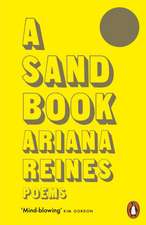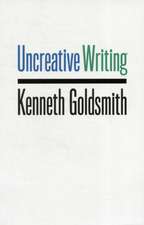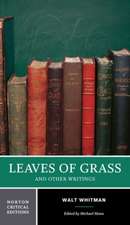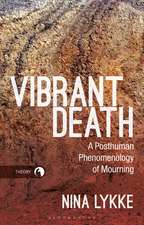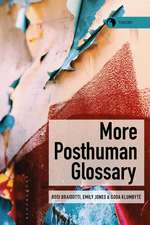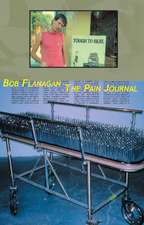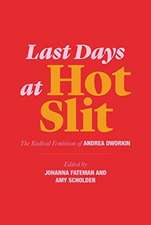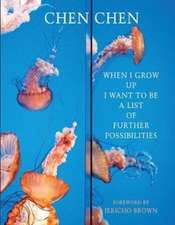Correction
Autor Thomas Bernhard Traducere de Sophie Wilkinsen Limba Engleză Paperback – 28 feb 2010
Considered by many critics to be Thomas Bernhard’s masterpiece, Correction is a cunningly crafted and unforgettable meditation on the tension between the desire for perfection and the knowledge that it is unattainable.
| Toate formatele și edițiile | Preț | Express |
|---|---|---|
| Paperback (2) | 52.48 lei 24-30 zile | +17.92 lei 5-11 zile |
| Vintage Publishing – 6 mar 2003 | 52.48 lei 24-30 zile | +17.92 lei 5-11 zile |
| Vintage International – 28 feb 2010 | 85.58 lei 3-5 săpt. |
Preț: 85.58 lei
Nou
Puncte Express: 128
Preț estimativ în valută:
16.38€ • 17.00$ • 13.66£
16.38€ • 17.00$ • 13.66£
Carte disponibilă
Livrare economică 03-17 martie
Preluare comenzi: 021 569.72.76
Specificații
ISBN-13: 9781400077601
ISBN-10: 1400077605
Pagini: 271
Dimensiuni: 134 x 207 x 17 mm
Greutate: 0.21 kg
Editura: Vintage International
ISBN-10: 1400077605
Pagini: 271
Dimensiuni: 134 x 207 x 17 mm
Greutate: 0.21 kg
Editura: Vintage International
Notă biografică
Thomas Bernhard was born in Holland in 1931 and grew up in Austria. He studied music at the Akademie Mozarteum in Salzburg. In 1957 he began a second career, as a playwright, poet, and novelist. The winner of the three most distinguished and coveted literary prizes awarded in Germany, he has become one of the most widely translated and admired writers of his generation. He published nine novels, an autobiography, one volume of poetry, four collections of short stories, and six volumes of plays. Thomas Bernhard died in Austria in 1989.
Extras
Hoeller's Garret
After a mild pulmonary infection, tended too little and too late, had suddenly turned into a severe pneumonia that took its toll of my entire body and laid me up for at least three months at nearby Wels, which has a hospital renowned in the field of so-called internal medicine, I accepted an invitation from Hoeller, a so-called taxidermist in the Aurach valley, not for the end of October, as the doctors urged, but for early in October, as I insisted, and then went on my own so-called responsibility straight to the Aurach valley and to Hoeller's house, without even a detour to visit my parents in Stocket, straight into the so-called Hoeller garret, to begin sifting and perhaps even arranging the literary remains of my friend, who was also a friend of the taxidermist Hoeller, Roithamer, after Roithamer's suicide, I went to work sifting and sorting the papers he had willed to me, consisting of thousands of slips covered with Roithamer's handwriting plus a bulky manuscript entitled "About Altensam and everything connected with Altensam, with special attention to the Cone." The atmosphere in Hoeller's house was still heavy, most of all with the circumstances of Roithamer's suicide, and seemed from the moment of my arrival favorable to my plan of working on Roithamer's papers there, specifically in Hoeller's garret, sifting and sorting Roithamer's papers and even, as I suddenly decided, simultaneously writing my own account of my work on these papers, as I have here begun to do, aided by having been able to move straight into Hoeller's garret without any reservations on Hoeller's part, even though the house had other suitable accommodations, I deliberately moved into that four-by-five-meter garret Roithamer was always so fond of, which was so ideal, especially in his last years, for his purposes, where I could stay as long as I liked, it was all the same to Hoeller, in this house built by the headstrong Hoeller in defiance of every rule of reason and architecture right here in the Aurach gorge, in the garret which Hoeller had designed and built as if for Roithamer's purposes, where Roithamer, after sixteen years in England with me, had spent the final years of his life almost continuously, and even prior to that he had found it convenient to spend at least his nights in the garret, especially while he was building the Cone for his sister in the Kobemausser forest, all the time the Cone was under construction he no longer slept at home in Altensam but always and only in Hoeller's garret, it was simply in every respect the ideal place for him during those last years when he, Roithamer, never went straight home to Altensam from England, but instead went every time to Hoeller's garret, to fortify himself in its simplicity (Hoeller house) for the complexity ahead (Cone), it would not do to go straight to Altensam from England, where each of us, working separately in his own scientific field, had been living in Cambridge all those years, he had to go straight to Hoeller's garret, if he did not follow this rule which had become a cherished habit, the visit to Altensam was a disaster from the start, so he simply could not let himself go directly from England to Altensam and everything connected with Altensam, whenever he had not made the detour via Hoeller's house, to save time, as he himself admitted, it had been a mistake, so he no longer made the experiment of going to Altensam without first stopping at Hoeller's house, in those last years, he never again went home without first visiting Hoeller and Hoeller's family and Hoeller's house, without first moving into Hoeller's garret, to devote himself for two or three days to such reading as he could do only in Hoeller's garret, of subject matter that was not harmful but helpful to him, books and articles he could read neither in Altensam nor in England, and to thinking and writing what he found possible to think and write neither in England nor in Altensam, here I discovered Hegel, he always said, over and over again, it was here that I really delved into Schopenhauer for the first time, here that I could read, for the first time, Goethe's Elective Affinities and The Sentimental Journey, without distraction and with a clear head, it was here, in Hoeller's garret, that I suddenly gained access to ideas to which my mind had been sealed for decades before I came to this garret, access, he wrote, to the most essential ideas, the most important for me, the most necessary to my life, here in Hoeller's garret, he wrote, everything became possible for me, everything that had always been impossible for me outside Hoeller's garret, such as letting myself be guided by my intellectual inclinations and to develop my natural aptitudes accordingly, and to get on with my work, everywhere else I had always been hindered in developing my aptitudes but in Hoeller's garret I could always develop them most consistently, here everything was congenial to my way of thinking, here .1 could always indulge myself in exploring all my intellectual possibilities, here in Hoeller's garret my head, my mind, my whole constitution were suddenly relieved from all the outside world's oppression, the most incredible things were suddenly no longer incredible, the most impossible (thinking!) no longer impossible. It was in Hoeller's garret that he found the conditions necessary and most favorable to thought, for getting the mechanism of his thought going in the most natural, most undistracted way, all he had to do was to come to Hoeller's garret from wherever he might be, and the mechanism worked. Whenever I was in England, he wrote, no matter how I felt, I was always thinking, if only I could be in Hoener's garret now, always when he had reached a dead end in his thinking and in his feelings, if only I could be in Hoeller's garret now, but on the other hand he realized that settling for good in Hoener's garret was not synonymous with always being able to think freely and without distraction, and that, if he could stay forever in Hoeller's garret, it would mean nothing less than his own total destruction, if I stay in Hoener's garret longer than need be, he wrote, I'll be done for in no time at all, that's the end of me, he thought, which is why he had always stayed in Hoeller's garret for only a definite period of time, how long exactly he could never foresee, but it had to be strictly limited, he must have considered a stay of fourteen to fifteen days in the Hoeller garret ideal, as his notes imply, always just fourteen or fifteen days, every time, on the fourteenth or fifteenth day, according to Hoeller, Roithamer always packed up in a flash and went off to Altensam, though he did not necessarily stay in Altensam for any length of time very often, but only for the shortest possible time, as little time as he could manage, the absolute, inescapable minimum, no more, he had even been known to take up residence in Hoeller's house with every intention of going on to Altensam after fourteen days or so, but instead of going on to Altensam where he was expected, where his arrival had already been announced, after fourteen or fifteen days, he went from Hoeller's place in the Aurach gorge straight back to England, because his stay at Hoeller's place, in the Hoeller ambience, had not only given him enough, but had actually advanced his thinking so much that he did not need to stop at Altensam but could go straight back to England, specifically Cambridge, where he was always both studying and teaching simultaneously and, as he always kept saying, he never exactly knew at any particular moment whether he was studying or teaching because, as he said, when I was teaching, I was in fact basically studying, and when I was studying, I was basically teaching. Actually I too found the atmosphere in Hoeller's house ideal, I immediately made myself at home in the garret which had been Roithamer's garret and will always remain Roithamer's garret, from the very start I had always intended to take notes on my work with Roithamer's papers and on the entire process involved, and I soon understood how perfect for Roithamer's purposes Hoeller's garret was, how he had settled into Hoeller's garret with its view to westward, pitch-dark it was over the raging Aurach, and to northward, also pitch dark, the water steadily and always noisily slapping and crashing against the wet, glistening rock-face, "rehearsing for AItensam in Hoeller's house" as he called those stays in Hoeller's house, specifically Hoeller's garret, stays that quickly succeeded one another in those last years, especially the last three years, when he went five or six times, for four or five months at a time, from England to Altensam, but actually only to Hoeller's garret, obviously attracted to it by Hoeller's work, those meticulous preservations of animals, and in general by all the curious conditions of the place, so intimately bound up with the play of light in the Aurach valley, where every day ran its course simply enough, but nature was always making itself so powerfully felt, a nature mostly in pain, and all the people there, Hoeller's parents and in-laws and his wife and his still school-age children, for whom everything turned on what game had been shot and gutted, what wildfowl shot and gutted, and all the related chores, all the circumstances of life were bound up with their natural surroundings, it became clear to me that Roithamer had found here in the Aurach gorge as he had nowhere else the inspiration for pressing on with his main task, the building of the Cone, that edifice as a work of art, which he had designed for his sister in three years of incessant mental concentration and which he had built in the following three years with the greatest effort, with what he called almost inhuman energy, built it in the very center of the Kobernausser forest. It was in Hoeller's garret, where I had now moved with Roithamer's papers, most of them relating to the building of the Cone, and I regard my work on Roithamer's papers as the ideal occupational therapy for myself after my long illness and also feel it is ideal, it was here that Roithamer had conceived the idea of the Cone and drawn up the basic plans for it, and the fact that even now, some months after Roithamer's death and half a year after his sister's death, his sister for whom he had built the Cone which is already abandoned to natural decay, Hoeller's garret still contains all the plans, all the books and articles, most of them never used but all of them collected by Roithamer in his last years with a view to building the Cone, all those books and articles in every possible language, including languages unknown to him but translated for him by his brother Johann who spoke many languages and in fact had a gift for languages like no other man I ever knew, the translations were also here in Hoener's garret, and I could see at once that there had to be hundreds of them, stacks of translations from Spanish and Portuguese, as I noticed when I entered the garret, hundreds if not thousands of laborious decipherments of probably important considerations for the construction and completion of the Cone by experts unknown to me but probably familiar to him, he hated the word architect, or architecture, he never said architect, or architecture, and when I or someone else said architect, or architecture, he instantly countered by saying that he could not stand hearing the word architect, or architecture, that these two words were nothing but malformations, verbal monstrosities which no thinking man would stoop to, and I never used the words architect, or architecture, in his presence, nor have I used them since, even Hoeller got accustomed to avoiding the words architect or architecture, like Roithamer we resorted to words such as master builder or building or the art of building; that the word B U I L D is one of the most beautiful in the language, we knew ever since Roithamer had spoken about it, in that same garret where I have now installed myself, one dismal rainy evening when we again, as so often, dreaded the onset of another one of those torrential floods that come tearing down the gorge to devastate the whole area sometimes, though this one receded unexpectedly, those floods in the Aurach gorge would do the most extensive damage but they always spared Hoener's house, all up and down the Aurach they did the most extensive damage but Hoener's house, which was built right into the cleft, was spared always, because Hoeller had known exactly what he was doing, everyone was amazed to see the whole Aurach valley buried in mud, ravaged and destroyed while Hoeller's house alone stood unscathed, incredibly, it was on this dismal rainy evening, with all of us living in fear of another such flood about to bemire and ravage everything in its path, though this time it did not happen, when Roithamer revealed to us the beauty of the word building and the beauty of the word build and the beauty of the phrase builder's masterwork. From time to time he would pick out a word like that, a word that had suddenly become luminous with meaning for him, pick out one word from among all those others, any word at all, and elucidate it to anyone, but usually to those of us who often came in the evening to Hoeller's house and always regularly on those weekends when Roithamer returned from England. Once, as I recall, he spent a whole night analyzing for us the word circumstance, the word condition, and the word consistent. It was touching to find all of Roithamer's books and articles and plans and his writing utensils and thinking aids still right there in Hoeller's garret, just as he had left them. Hoeller's garret was where all the ideas and designs for building the Cone had come into being, here all the ideas had originated, all the plans were sketched, all the necessary decisions for building the Cone had been made here, it was from here Roithamer had directed everything.
After a mild pulmonary infection, tended too little and too late, had suddenly turned into a severe pneumonia that took its toll of my entire body and laid me up for at least three months at nearby Wels, which has a hospital renowned in the field of so-called internal medicine, I accepted an invitation from Hoeller, a so-called taxidermist in the Aurach valley, not for the end of October, as the doctors urged, but for early in October, as I insisted, and then went on my own so-called responsibility straight to the Aurach valley and to Hoeller's house, without even a detour to visit my parents in Stocket, straight into the so-called Hoeller garret, to begin sifting and perhaps even arranging the literary remains of my friend, who was also a friend of the taxidermist Hoeller, Roithamer, after Roithamer's suicide, I went to work sifting and sorting the papers he had willed to me, consisting of thousands of slips covered with Roithamer's handwriting plus a bulky manuscript entitled "About Altensam and everything connected with Altensam, with special attention to the Cone." The atmosphere in Hoeller's house was still heavy, most of all with the circumstances of Roithamer's suicide, and seemed from the moment of my arrival favorable to my plan of working on Roithamer's papers there, specifically in Hoeller's garret, sifting and sorting Roithamer's papers and even, as I suddenly decided, simultaneously writing my own account of my work on these papers, as I have here begun to do, aided by having been able to move straight into Hoeller's garret without any reservations on Hoeller's part, even though the house had other suitable accommodations, I deliberately moved into that four-by-five-meter garret Roithamer was always so fond of, which was so ideal, especially in his last years, for his purposes, where I could stay as long as I liked, it was all the same to Hoeller, in this house built by the headstrong Hoeller in defiance of every rule of reason and architecture right here in the Aurach gorge, in the garret which Hoeller had designed and built as if for Roithamer's purposes, where Roithamer, after sixteen years in England with me, had spent the final years of his life almost continuously, and even prior to that he had found it convenient to spend at least his nights in the garret, especially while he was building the Cone for his sister in the Kobemausser forest, all the time the Cone was under construction he no longer slept at home in Altensam but always and only in Hoeller's garret, it was simply in every respect the ideal place for him during those last years when he, Roithamer, never went straight home to Altensam from England, but instead went every time to Hoeller's garret, to fortify himself in its simplicity (Hoeller house) for the complexity ahead (Cone), it would not do to go straight to Altensam from England, where each of us, working separately in his own scientific field, had been living in Cambridge all those years, he had to go straight to Hoeller's garret, if he did not follow this rule which had become a cherished habit, the visit to Altensam was a disaster from the start, so he simply could not let himself go directly from England to Altensam and everything connected with Altensam, whenever he had not made the detour via Hoeller's house, to save time, as he himself admitted, it had been a mistake, so he no longer made the experiment of going to Altensam without first stopping at Hoeller's house, in those last years, he never again went home without first visiting Hoeller and Hoeller's family and Hoeller's house, without first moving into Hoeller's garret, to devote himself for two or three days to such reading as he could do only in Hoeller's garret, of subject matter that was not harmful but helpful to him, books and articles he could read neither in Altensam nor in England, and to thinking and writing what he found possible to think and write neither in England nor in Altensam, here I discovered Hegel, he always said, over and over again, it was here that I really delved into Schopenhauer for the first time, here that I could read, for the first time, Goethe's Elective Affinities and The Sentimental Journey, without distraction and with a clear head, it was here, in Hoeller's garret, that I suddenly gained access to ideas to which my mind had been sealed for decades before I came to this garret, access, he wrote, to the most essential ideas, the most important for me, the most necessary to my life, here in Hoeller's garret, he wrote, everything became possible for me, everything that had always been impossible for me outside Hoeller's garret, such as letting myself be guided by my intellectual inclinations and to develop my natural aptitudes accordingly, and to get on with my work, everywhere else I had always been hindered in developing my aptitudes but in Hoeller's garret I could always develop them most consistently, here everything was congenial to my way of thinking, here .1 could always indulge myself in exploring all my intellectual possibilities, here in Hoeller's garret my head, my mind, my whole constitution were suddenly relieved from all the outside world's oppression, the most incredible things were suddenly no longer incredible, the most impossible (thinking!) no longer impossible. It was in Hoeller's garret that he found the conditions necessary and most favorable to thought, for getting the mechanism of his thought going in the most natural, most undistracted way, all he had to do was to come to Hoeller's garret from wherever he might be, and the mechanism worked. Whenever I was in England, he wrote, no matter how I felt, I was always thinking, if only I could be in Hoener's garret now, always when he had reached a dead end in his thinking and in his feelings, if only I could be in Hoeller's garret now, but on the other hand he realized that settling for good in Hoener's garret was not synonymous with always being able to think freely and without distraction, and that, if he could stay forever in Hoeller's garret, it would mean nothing less than his own total destruction, if I stay in Hoener's garret longer than need be, he wrote, I'll be done for in no time at all, that's the end of me, he thought, which is why he had always stayed in Hoeller's garret for only a definite period of time, how long exactly he could never foresee, but it had to be strictly limited, he must have considered a stay of fourteen to fifteen days in the Hoeller garret ideal, as his notes imply, always just fourteen or fifteen days, every time, on the fourteenth or fifteenth day, according to Hoeller, Roithamer always packed up in a flash and went off to Altensam, though he did not necessarily stay in Altensam for any length of time very often, but only for the shortest possible time, as little time as he could manage, the absolute, inescapable minimum, no more, he had even been known to take up residence in Hoeller's house with every intention of going on to Altensam after fourteen days or so, but instead of going on to Altensam where he was expected, where his arrival had already been announced, after fourteen or fifteen days, he went from Hoeller's place in the Aurach gorge straight back to England, because his stay at Hoeller's place, in the Hoeller ambience, had not only given him enough, but had actually advanced his thinking so much that he did not need to stop at Altensam but could go straight back to England, specifically Cambridge, where he was always both studying and teaching simultaneously and, as he always kept saying, he never exactly knew at any particular moment whether he was studying or teaching because, as he said, when I was teaching, I was in fact basically studying, and when I was studying, I was basically teaching. Actually I too found the atmosphere in Hoeller's house ideal, I immediately made myself at home in the garret which had been Roithamer's garret and will always remain Roithamer's garret, from the very start I had always intended to take notes on my work with Roithamer's papers and on the entire process involved, and I soon understood how perfect for Roithamer's purposes Hoeller's garret was, how he had settled into Hoeller's garret with its view to westward, pitch-dark it was over the raging Aurach, and to northward, also pitch dark, the water steadily and always noisily slapping and crashing against the wet, glistening rock-face, "rehearsing for AItensam in Hoeller's house" as he called those stays in Hoeller's house, specifically Hoeller's garret, stays that quickly succeeded one another in those last years, especially the last three years, when he went five or six times, for four or five months at a time, from England to Altensam, but actually only to Hoeller's garret, obviously attracted to it by Hoeller's work, those meticulous preservations of animals, and in general by all the curious conditions of the place, so intimately bound up with the play of light in the Aurach valley, where every day ran its course simply enough, but nature was always making itself so powerfully felt, a nature mostly in pain, and all the people there, Hoeller's parents and in-laws and his wife and his still school-age children, for whom everything turned on what game had been shot and gutted, what wildfowl shot and gutted, and all the related chores, all the circumstances of life were bound up with their natural surroundings, it became clear to me that Roithamer had found here in the Aurach gorge as he had nowhere else the inspiration for pressing on with his main task, the building of the Cone, that edifice as a work of art, which he had designed for his sister in three years of incessant mental concentration and which he had built in the following three years with the greatest effort, with what he called almost inhuman energy, built it in the very center of the Kobernausser forest. It was in Hoeller's garret, where I had now moved with Roithamer's papers, most of them relating to the building of the Cone, and I regard my work on Roithamer's papers as the ideal occupational therapy for myself after my long illness and also feel it is ideal, it was here that Roithamer had conceived the idea of the Cone and drawn up the basic plans for it, and the fact that even now, some months after Roithamer's death and half a year after his sister's death, his sister for whom he had built the Cone which is already abandoned to natural decay, Hoeller's garret still contains all the plans, all the books and articles, most of them never used but all of them collected by Roithamer in his last years with a view to building the Cone, all those books and articles in every possible language, including languages unknown to him but translated for him by his brother Johann who spoke many languages and in fact had a gift for languages like no other man I ever knew, the translations were also here in Hoener's garret, and I could see at once that there had to be hundreds of them, stacks of translations from Spanish and Portuguese, as I noticed when I entered the garret, hundreds if not thousands of laborious decipherments of probably important considerations for the construction and completion of the Cone by experts unknown to me but probably familiar to him, he hated the word architect, or architecture, he never said architect, or architecture, and when I or someone else said architect, or architecture, he instantly countered by saying that he could not stand hearing the word architect, or architecture, that these two words were nothing but malformations, verbal monstrosities which no thinking man would stoop to, and I never used the words architect, or architecture, in his presence, nor have I used them since, even Hoeller got accustomed to avoiding the words architect or architecture, like Roithamer we resorted to words such as master builder or building or the art of building; that the word B U I L D is one of the most beautiful in the language, we knew ever since Roithamer had spoken about it, in that same garret where I have now installed myself, one dismal rainy evening when we again, as so often, dreaded the onset of another one of those torrential floods that come tearing down the gorge to devastate the whole area sometimes, though this one receded unexpectedly, those floods in the Aurach gorge would do the most extensive damage but they always spared Hoener's house, all up and down the Aurach they did the most extensive damage but Hoener's house, which was built right into the cleft, was spared always, because Hoeller had known exactly what he was doing, everyone was amazed to see the whole Aurach valley buried in mud, ravaged and destroyed while Hoeller's house alone stood unscathed, incredibly, it was on this dismal rainy evening, with all of us living in fear of another such flood about to bemire and ravage everything in its path, though this time it did not happen, when Roithamer revealed to us the beauty of the word building and the beauty of the word build and the beauty of the phrase builder's masterwork. From time to time he would pick out a word like that, a word that had suddenly become luminous with meaning for him, pick out one word from among all those others, any word at all, and elucidate it to anyone, but usually to those of us who often came in the evening to Hoeller's house and always regularly on those weekends when Roithamer returned from England. Once, as I recall, he spent a whole night analyzing for us the word circumstance, the word condition, and the word consistent. It was touching to find all of Roithamer's books and articles and plans and his writing utensils and thinking aids still right there in Hoeller's garret, just as he had left them. Hoeller's garret was where all the ideas and designs for building the Cone had come into being, here all the ideas had originated, all the plans were sketched, all the necessary decisions for building the Cone had been made here, it was from here Roithamer had directed everything.
Recenzii
“Astonishingly original, a composition of strange new beauty.”
—The Nation
“As readers we are in the relentless grip of Bernhard. One marvels at the consistency of his austere vision.”
—The New York Times Book Review
“Remarkable. . . . Bernhard’s prose is lapidary and translucent.”
—Times Literary Supplement (London)
“Little by little, with supernatural patience, prodigious cunning and craft—like Joseph Heller in Catch-22—Bernhard fashions an original angle of vision that transforms our understanding. We see elephants beside us in a room where no one mentions elephants.”
—John Edgar Wideman, O, The Oprah Magazine
—The Nation
“As readers we are in the relentless grip of Bernhard. One marvels at the consistency of his austere vision.”
—The New York Times Book Review
“Remarkable. . . . Bernhard’s prose is lapidary and translucent.”
—Times Literary Supplement (London)
“Little by little, with supernatural patience, prodigious cunning and craft—like Joseph Heller in Catch-22—Bernhard fashions an original angle of vision that transforms our understanding. We see elephants beside us in a room where no one mentions elephants.”
—John Edgar Wideman, O, The Oprah Magazine
Descriere
Considered by many critics to be Bernhard's masterpiece, "Correction" is a cunningly crafted and unforgettable meditation on the tension between the desire for perfection and the knowledge that it is unattainable.


